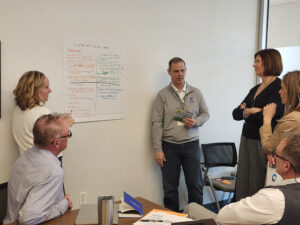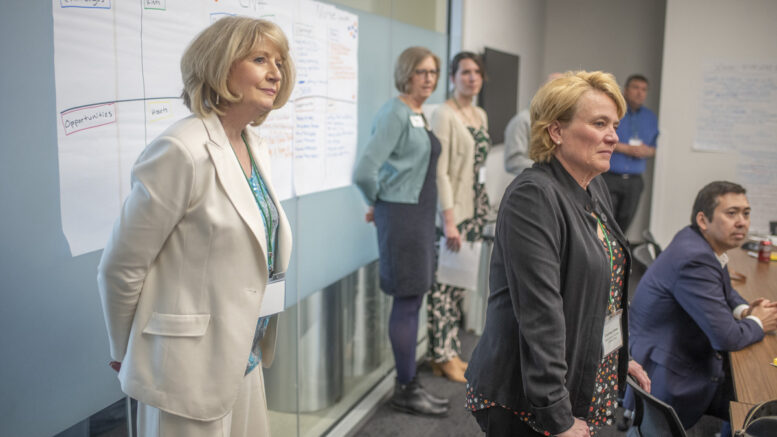Business and educational leaders came together Tuesday to plot new career pathways in manufacturing, construction and health care for northern Colorado and the Eastern Plains at the first of a series of seven summits designed to shake up workforce development.
The Opportunity Now Regional Talent Summits — a product of a 2024 law that stemmed from a 2023 report by the business-led Education to Employment Alliance — comes as business leaders cite talent shortages as one of their biggest operational impediments. And they come as more than half of all Colorado high-school graduates are not seeking any advanced degrees or certifications, leaving many unprepared for careers at a time when nearly 92% of sustainably paying jobs require some post-secondary education.
Each of the summits, which are spread across seven regions, focus on three priority industries and bring employers and educators to the same table to discuss what more must be done to get learners the skills that match those needed for jobs. About 100 people attended Tuesday’s event at the University of Northern Colorado, which included leaders from Larimer and Weld counties as well as much of the Eastern Plains.
Attendees brought a wide range of concerns and problems to the table. Manufacturing leaders said that too many job applicants don’t have even the basic mechanical or intrinsic skills to do the jobs they are seeking. Construction leaders said they struggle to create talent pipelines because students get too little exposure to considering a career in the field. And health-care officials said that while some pathways have developed to increase sector workers, others remain limited and too often are inhibited by what job seekers consider a lack of upward mobility within the profession.

Attendees at Tuesday’s Opportunity Now Regional Talent Summit whiteboard ideas on how to bolster talent pipelines in the construction industry.
Bevy of reasons that talent pipelines need improvement
After day-long discussions, leaders in each industry field veered away from the idea of creating new credentialing paths for specific jobs — say, a welder or a surgical technician— and pledged to develop holistic new pathways to benefit the entire sector. Yvonne Myers — vice president of strategic initiatives for the Fort Collins Area Chamber of Commerce, the regional host for the event — said her top takeaway from the day was that attendees eschewed simple reforms for a chance to keep working on comprehensive plans that will overhaul the way workforce training is done now.
“I think it helped to see that in the gaps that we feel every day, we’re not alone,” said Tim Seltz, senior brewery general manager for Anheuser-Busch InBev in Fort Collins. “It is a more Colorado-wide gap that we are trying to solve, and we’re going to have to get creative to solve it.”
Discussions among manufacturing officials who attended the event showed how complex the issues are that are getting in the way of their hiring — and, in turn, are slowing the potential expansion and job creation of companies — right now. Both state and regional officials have targeted advanced manufacturing as a priority industry for growth, and the federal government is offering funding to “re-shore” overseas operations.

Tim Seltz of Anheuser-Busch leads manufacturing leaders in generating ideas about talent-pipeline improvements on Tuesday.
A deep dive into crafting manufacturing careers
When asked to identify the skills that job applicants lack, leaders pointed to many core attributes that transcend sector boundaries, including problem-solving, adaptability, inquisitiveness and resilience. Several noted that while they would like to see more training in mechanical aptitude, as well as math, that education and training must be done in conjunction with teaching the “soft skills” that allow workers to succeed.
Thus, rather than develop a new training course for machinists or electricians with the school districts and higher-education institutions that participated in the breakout session, participants said they need to craft a new way to get learners both technical and core skills. One rough idea involved having employers agree to hire students who show mechanical aptitude and work with community colleges to help pay for them to go through a program while they are working that would bolster needed skills and credential their progress.

Mark Johnston, director of workforce development for Larimer County, participates in Tuesday’s summit.
Julia Lambert — a human-resources professional at Rocky Mountain Natural Meats, which has begun internal training of workers interested in moving into equipment maintenance — said she left the summit committed to working with others to develop this new pathway. But she also said that she expects to use the connections she made at the summit to set up more position-specific training partnerships with a local college and other employers in the food-and-beverage-manufacturing space to fill holes that all of them reported.
“It definitely planted a seed of solutions that I’d never visualized before,” Lambert said.
More visibility, specific pathways needed
One theme across all three industry sectors was the need to promote within schools those career options that don’t require a four-year degree — a need that construction and manufacturing leaders particularly cited as a reason for currently limited talent pipelines. Construction leaders, in fact, said that in addition to connecting high-school students with job opportunities, they need to work more with groups training older people, from adults looking to switch sectors to justice-involved individuals, to bring in those folks.
Though such efforts are underway in some communities, attendees committed to working more within sectors and through established sector partnerships to increase their visibility to students as young as middle school to get them thinking about career pathways. Manufacturing leaders, for example, said that they would host more tours of their plants and host specific career-opportunity days in school districts for students who have shown aptitude toward that field and want to learn about job and apprenticeship possibilities.

St. Vrain Valley School District Superintendent Don Haddad participates in Tuesday’s summit.
Another common theme was the need to create more career pathways to guide entry-level workers into a sector rather than just assuming that graduates will build aptitude needed to enter a career. Health-care leaders committed to assessing their greatest job needs as a regional sector — a pre-summit survey showed that nurses, medical assistants and certified nurse assistants were among them — and then partnering to create pathways into those positions.
For the health-care leaders, one of the new tactics to come from the event was a decision to involve a wide swath of employers, ranging from hospitals to physician practices to nonprofits, in developing the pathways rather than have individual employers go it alone.
“Felt for decades to come”
And in addition to bolstering visibility and partnerships with schools, construction leaders vowed to work to remove legal barriers that limit their ability to train potential workers. St. Vrain Valley School District Superintendent Don Haddad said those include restrictions on who can teach profession-focused courses and current state laws that make it infeasible for employers to bring on student workers due to potential insurance costs.
Innovate Work Consulting, the summit facilitator, will take the consensus suggestions from participants and craft them into two- and five-year plans for which it will seek further attendee guidance before adding them to the annual Colorado Talent Pipeline Report. The Colorado Workforce Development Council will oversee implementation of the plans in accordance with the industry and education partners identified in each plan.
The next summit — focused on aerospace/defense, clean/renewable energy and advanced manufacturing — is scheduled for March 18 at The Arvada Center. Further summits will take place between April and June in Pueblo, Grand Junction, Durango, Edwards and Colorado Springs.

OEDIT Executive Director Eve Lieberman participates in Tuesday’s summit.
Eve Lieberman — executive director of the Colorado Office of Economic Development and International Trade, which is organizing the summits — said she believes that Tuesday’s discussions are setting the stage for transformational changes to workforce development. Plus, Lieberman said, the palpable energy in the general and breakout sessions demonstrated industry leaders want to have a strong presence in crafting talent pipelines and are key to ensuring Colorado learners have the skills needed for successful careers.
“The work you’re doing today is not just a one-day excursion,” Lieberman told attendees. “It’s going to be felt for decades to come.”
